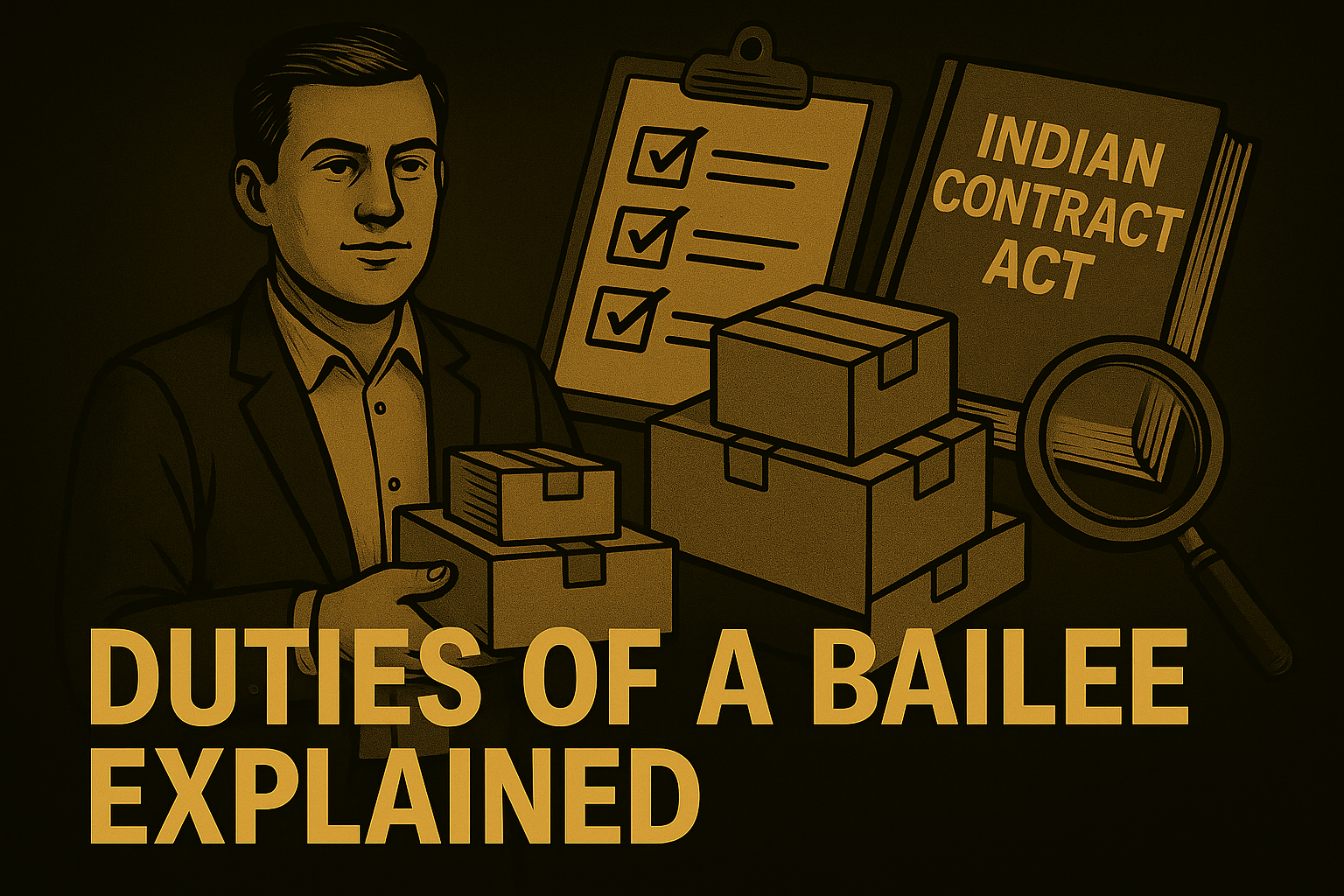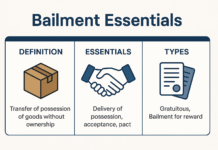Explain in detail, the duties of a bailee in respect of goods bailed. What rights are available to a bailor when the bailee mixes the goods bailed with his own goods?
Or What are the rights and duties of a bailor and bailee interse in respect of the goods of bailment?
The Responsibilities of a Bailee: Taking Care of What’s Not Yours
When you entrust your goods to someone else under a contract of bailment, that person (the bailee) takes on certain important responsibilities. Let’s explore these duties in detail.
Duties of a Bailee
- Duty to Take Reasonable Care (Section 151):The cornerstone of a bailee’s responsibility is to care for the bailed goods as a person of ordinary prudence would care for their own goods of similar nature, quality, and value under the same circumstances.1
- Historically, English law differentiated between bailees for reward and gratuitous bailees (those who receive no payment), holding the former to a higher standard of care.2 However, modernly, the standard of reasonable care is generally applied.
- Section 152 clarifies that a bailee is not responsible for loss, destruction, or deterioration of the bailed goods if they have taken the care described in Section 151, unless there’s a specific contract stating otherwise.3
- Duty to Return the Goods Bailed (Section 160 & 161): A bailee must return the bailed goods to the bailor (or according to the bailor’s directions) without demand, as soon as the purpose of the bailment is accomplished or the agreed-upon time has expired.4
- If the bailee fails to return, deliver, or tender the goods at the proper time due to their fault, they are responsible to the bailor for any loss, destruction, or deterioration of the goods from that point onwards (Section 161).
- In Union of India Vs. Amar Singh (1960), the government (as the bailor) held the railway liable for lost goods.
- In Shaw & Co. Vs. Symmous & Sons (1917), a bookbinder was held liable for books lost in a fire because they were not returned within a reasonable time.5
- Duty to Not Make Improper Use of Goods Bailed (Sections 153 & 154): The bailee must use the bailed goods according to the terms of the bailment.6 If they use the goods inconsistently with these terms, the bailment contract becomes voidable at the bailor’s option.7
- Furthermore, if improper use causes any damage to the goods, the bailee is liable to compensate the bailor for that damage (Section 154).8
- Lending a hired horse for personal riding to a family member who then injures it makes the hirer liable.9
- Riding a horse hired for a journey to Banaras to Cuttack instead, and the horse gets injured, makes the hirer liable for the injury.10
- Duty Not to Mix His Own Goods with the Goods of the Bailor (Sections 155, 156, & 157):A bailee should not mix their own goods with the bailor’s goods. The consequences of mixing depend on whether the mixing was done with consent and whether the goods can be separated.11
- With Consent (Section 155): If the bailee mixes the goods with the bailor’s consent, both parties have an interest in the mixture proportional to their respective shares.
- Without Consent – Separable Goods (Section 156): If the bailee mixes the goods without consent, and the goods can be separated, the ownership of the respective goods remains with the parties.12 The bailee is responsible for the expenses of separation and any damage caused by the mixture. Example: Mixing uniquely marked cotton bales without consent requires the bailee to bear the separation costs and any related damage.13
- Without Consent – Inseparable Goods (Section 157): If the bailee mixes the goods without consent, and they become inseparable, the bailee is liable to compensate the bailor for the loss of their goods. Example: Mixing expensive flour with cheaper flour without consent requires the bailee to compensate for the value of the expensive flour.
- Duty of Bailee Not to Question the Title of Bailor (Section 166):Generally, a bailee cannot dispute the bailor’s title to the goods.14 If the bailee, in good faith, returns the goods to the bailor or according to the bailor’s directions, they are not liable to the actual owner, even if the bailor had no right to bail them.15
- Duty to Pay Increase or Profit to the Bailor (Section 163): A bailee is obligated to return not only the bailed goods but also any increase or profit that has accrued from those goods.16 Examples:
- Returning a calf along with the cow that was bailed.17
- In Moti Lal Hira Bhai Vs. Bai Mani (1925), the Privy Council held that new shares allotted for pledged old shares were considered an increase or profit belonging to the pledger.18
Rights of a Bailor When Goods are Mixed
Now, let’s specifically address the rights available to a bailor when the bailee mixes the bailed goods with their own:
As outlined above, the bailor’s rights in case of mixing depend on whether the mixing was consensual and whether the goods are separable:
- Mixing with Consent (Section 155): The bailor has a proportional interest in the mixed goods.
- Mixing Without Consent – Separable Goods (Section 156): The bailor has the right to have their original goods returned and is entitled to recover any expenses incurred in the separation, as well as any damages resulting from the mixture.
- Mixing Without Consent – Inseparable Goods (Section 157): The bailor is entitled to be compensated by the bailee for the loss of their goods.
















